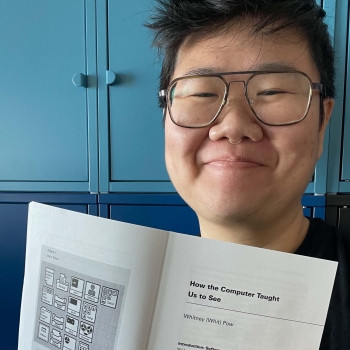
Whit Pow (they/them) is a media historian whose teaching and research lies at the intersection of transgender media studies, trans of color critique, queer theory, electronic art, and video game and computer history.
Pow centers the idea of mediation to identify the way that the lives and bodies of trans people of color are mediated by the state through archives and bureaucratic documents like birth certificates, immigration forms, sign-in sheets as well as medical diagnostic practices ongoing today like those documented in the Diagnostic and Statistical Manual and its iterations. Pow's work examines how these very much racialized biopolitical and necropolitical processes of documentation, enumeration, and surveillance of trans BIPOC exist today in the oftentimes “invisible” or normalized logics built into computers and computational systems like software, video games, artificial intelligence, and online and networked media.
Selected Publications
Books
Pow, Whitney (Whit). Unmediating: A Trans Media HIstory. Under contract with Courtney Berger at Duke University Press, as part of the ASTERISK: Gender, Trans- and All that comes After trans studies book series edited by Susan Stryker, Eliza Steinbock, Jian Neo Chen and Marquis Bey.
Articles
Pow, Whitney (Whit). “The Noise Hits All at Once: A Trans History of the Votrax SC-01 Voice Synthesis Chip.” Flow Journal: A Critical Forum on Media and Culture (associated with the Department of Radio-Television-Film at the University of Texas at Austin). December 2, 2025. https://www.flowjournal.org/2025/12/noise-hits-all-at-once/
Pow, Whitney (Whit). “How the Computer Taught Us to See” (Peer Reviewed). Camera Obscura: Feminism, Culture, and Media Studies 39, no. 2 (116) (September 1, 2024): 1–39. https://doi.org/10.1215/02705346-11207789.
Pow, Whitney (Whit). "Critical Game Studies and Its Afterlives: Why Game Studies Needs Software Studies and Computer History” (Peer Reviewed). Just Tech. Social Science Research Council. June 5, 2024. DOI: doi.org/10.35650/JT.3071.d.2024.
Pow, Whitney (Whit). “Glitch, Body, Anti-Body.” For the special issue on glitch edited by Rosa Menkman for Outland: An Online Art Magazine for the NFT Era, December 14, 2023. https://www.whitneypow.com/articles/glitch-body-anti-body
Pow, Whitney (Whit). “A Trans Historiography of Glitches and Errors” (Peer Reviewed). Feminist Media Histories 7, no. 1 (January 1, 2021): 197–230. https://doi.org/10.1525/fmh.2021.7.1.197.
Pow, Whitney (Whit). “Outside of the Folder, the Box, the Archive: Moving Toward a Reparative Video Game History.” ROMchip: A Journal of Game Histories Vol 1, No. 1 (July 2019). https://romchip.org/index.php/romchip-journal/article/view/76
Pow, Whitney (Whit). “Reaching Toward Home: Software Interface as Queer Orientation in the Video Game Curtain” (Peer Reviewed). The Velvet Light Trap, vol. 81 (Spring 2018): 43-56. https://doi.org/10.7560/VLT8105
